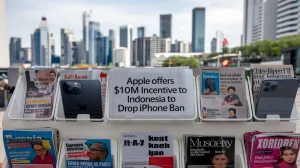Apple makes incentive offer for Indonesia to drop iPhone ban

Apple has enticed the government of Indonesia with an investment proposal worth around $10 million, in its efforts to have a ban on its latest iPhone revoked.
The US tech giant has pledged to set up production in a factory in Bandung, southeast of Jakarta, in collaboration with partner suppliers.
As reported by Bloomberg, sources close to developments provided details on condition of anonymity. It is claimed the Apple plant would make parts and accessories for the iPhone maker’s devices, in line with local regulations.
As things stand, the company has no standalone sites in Indonesia.
Apple, which recently introduced a new child safety feature, has made the offer to Indonesia’s Ministry of Industry after it was barred from selling its iPhone 16 in the country due to a dispute over locally produced components.
Last month, the US tech multinational was told it had not met the 40% local content stipulation for smartphones, as set out by the Ministry. It pushed back against the iPhone maker’s local entity, PT Apple Indonesia, with a warning the requirements had not been met.
The subsidiary was told its investment commitment had not been reached, with the 40% guideline equating to 1.5 trillion rupees ($95m) and not the agreed 1.7t.
With this latest play by Apple changing the picture, the Ministry is said to be considering the proposal, with a possibility of further negotiation between the parties.
A $10m uplift would represent a snip for Apple, especially as it could unlock access to Indonesia’s $1 trillion economy, with a market of over 350 million active smartphones within a population of 270 million.
Continuation of Indonesian government policyGoogle was also embroiled in a similar situation, a direct consequence of President Prabowo Subianto’s policy to pressure international companies to stimulate local manufacturing and protect domestic markets.
Previously, the Pixel phone was banned in Indonesia after the Alphabet-owned company had not followed through on investment.
Subianto is the incumbent leader, taking his lead from former president Joko Widodo and his administration, who pursued this approach against TikTok owner, ByteDance. That dispute centered around cheap Chinese-made goods, ultimately leading to a $1.5 billion investment in partnership with an Indonesian e-commerce firm.
The firm approach to multinationals has its benefits as detailed above, it can lead to rewards but it could also deter major companies from expanding into Indonesia, particularly those who may be looking to pivot away from China in the region.
Image credit: Via Ideogram
The post Apple makes incentive offer for Indonesia to drop iPhone ban appeared first on ReadWrite.
